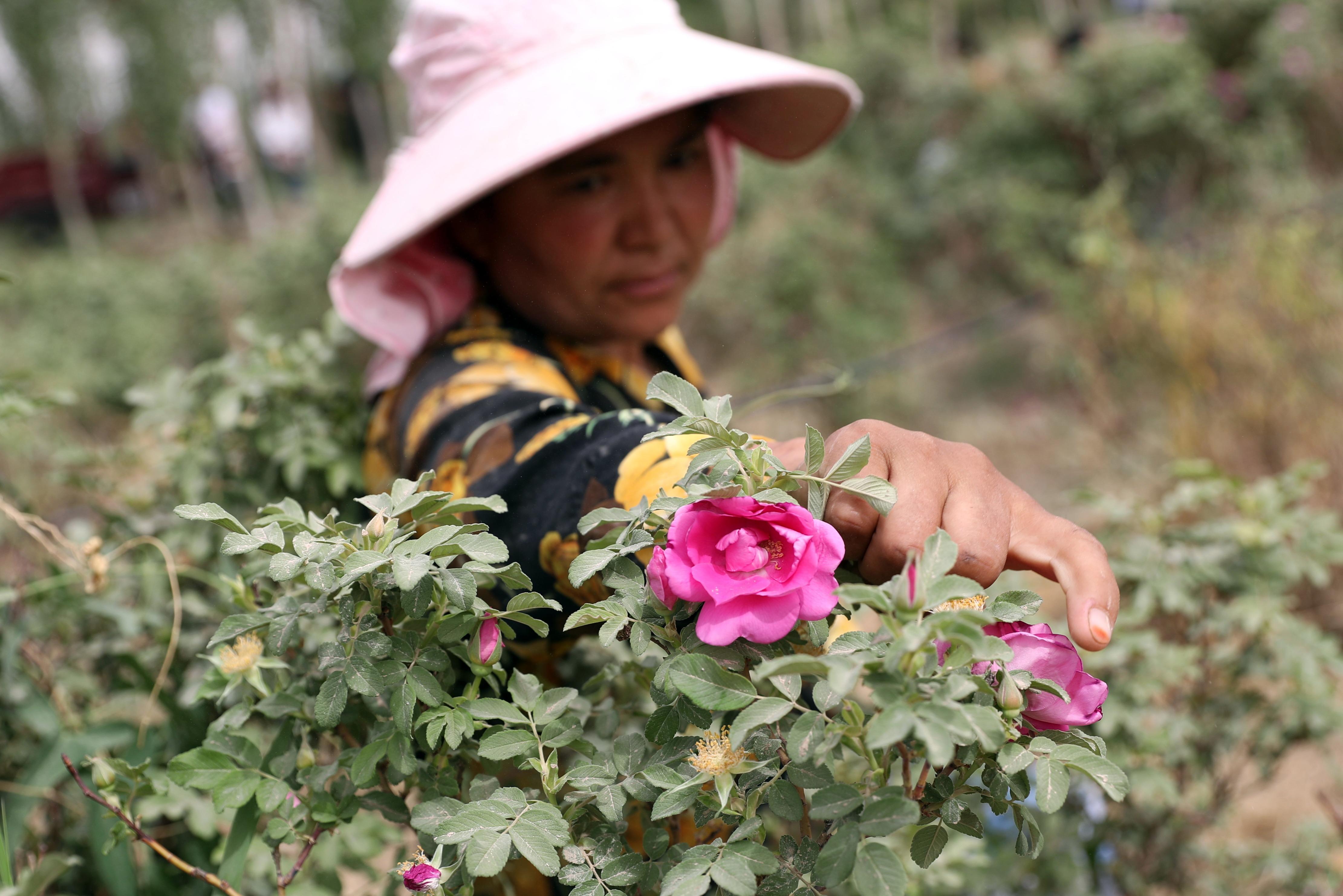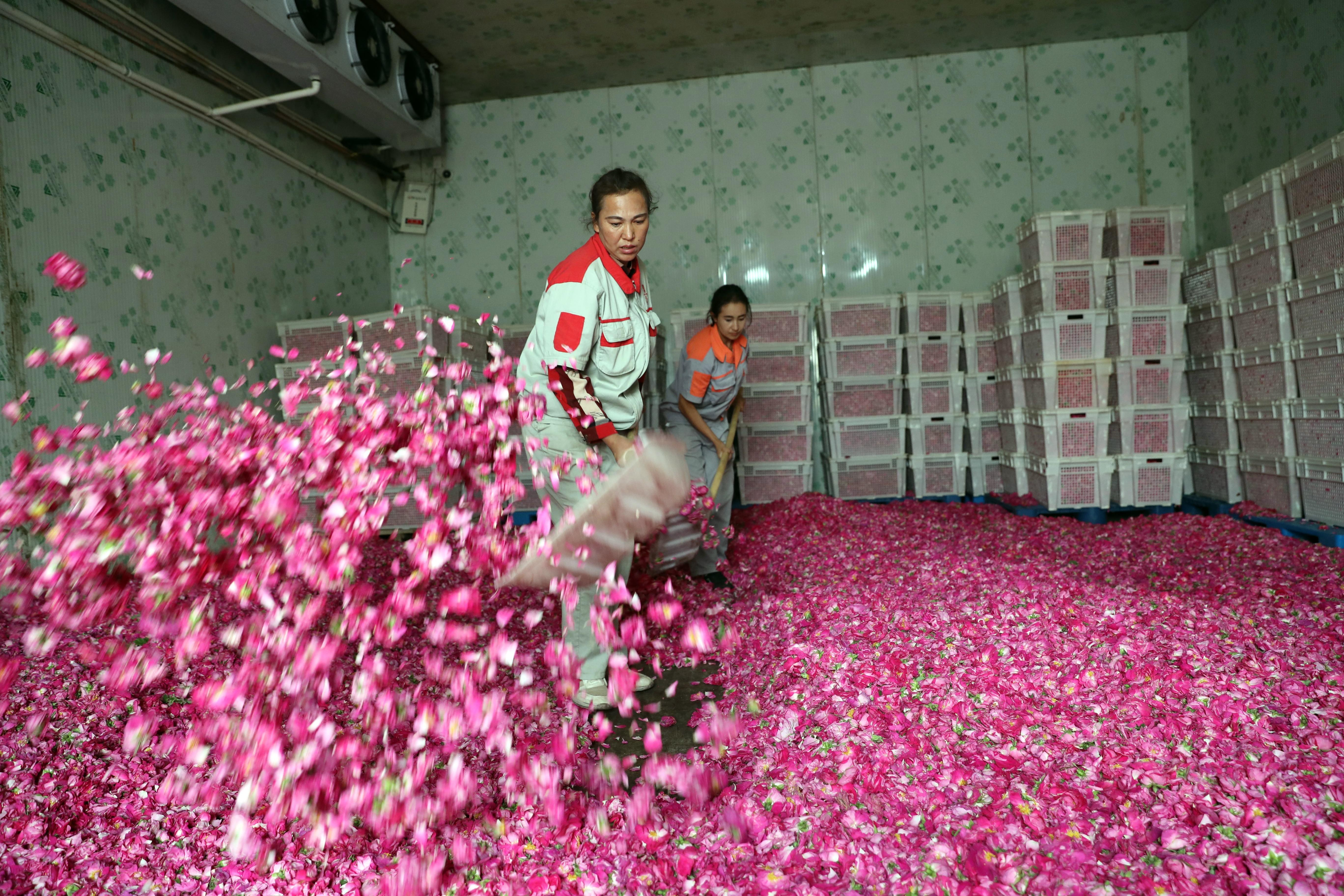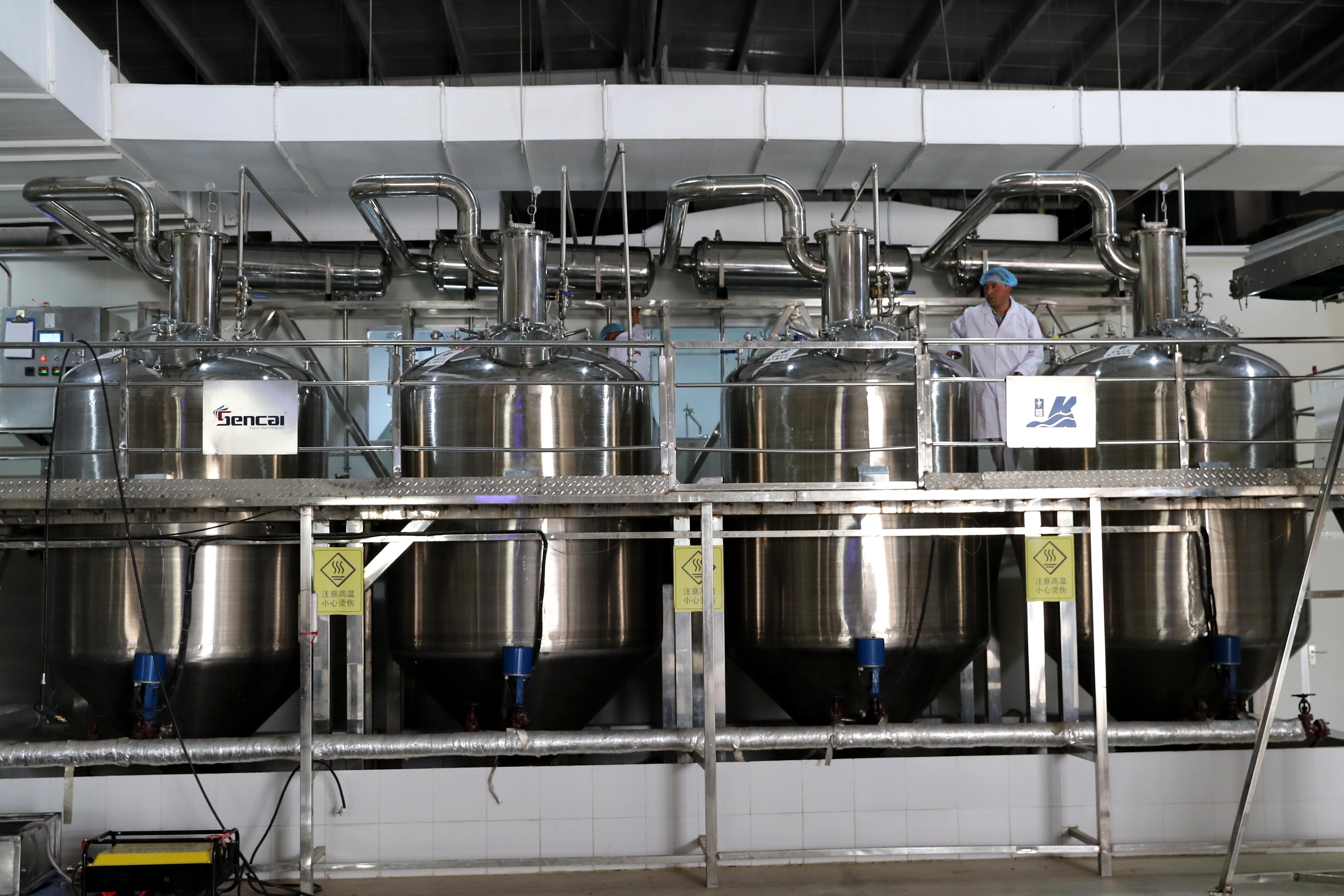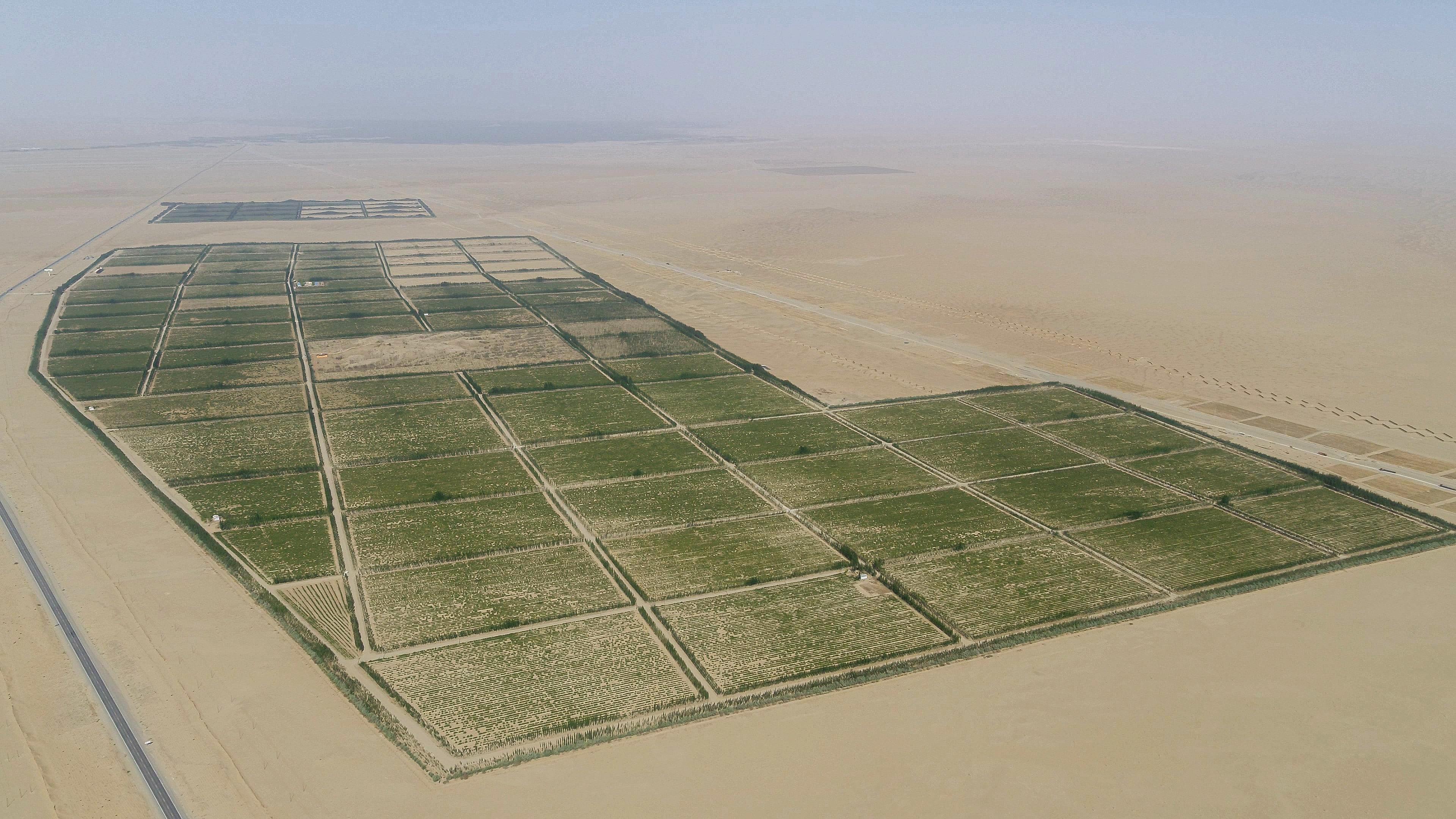Xinjiang plantation creates jobs, brings wealth to area
 A farmer picks roses in Yutian county, Xinjiang Uygur autonomous region. (WANG ZHUANGFEI / CHINA DAILY)
A farmer picks roses in Yutian county, Xinjiang Uygur autonomous region. (WANG ZHUANGFEI / CHINA DAILY)
Roses are now flourishing in northwestern China's harsh environments thanks to drip irrigation technology.
In Yutian county, an oasis area in the Xinjiang Uygur autonomous region, they have burst into bloom over vast areas of sun-scorched sandy fields on the edge of the nation's largest desert, the Taklimakan.
Roses have been grown in the greater Hotan region, which includes Yutian, for centuries for use in tea and medicine.
Rows of soaring poplar trees planted along the periphery of a 670-hectare plantation separate two worlds in Yutian. On one side of the trees is an untouched landscape of ever-shifting sand dunes, while on the other, pink willows and drought-resistant plants alternate with rose bushes.
Twelve wells supply irrigation water, and thin black tubes covering a total length of 2,000 kilometers snake through the rose bushes. Droplets containing a mixture of water and fertilizer seep from the tubes into the plants' roots.
 Workers handle rose petals at a factory in Yutian. (WANG ZHUANGFEI / CHINA DAILY)
Workers handle rose petals at a factory in Yutian. (WANG ZHUANGFEI / CHINA DAILY)
This rose-growing venture is operated by Queme, the subsidiary of a State-owned business based in Urumqi, the regional capital.
A decade ago, as part of an assistance program to help develop Yutian, Queme's parent company sent a team of investigators to the then-impoverished county. The investigators decided to build the plantation.
They also proposed building a factory to process rose petals into rose essence at an industrial park about 20 km away. Rose extractions are widely used in a range of food and cosmetics products, including jam, wine and face lotions.
Wearing a sun hat, Liu Zhiyong, Queme's deputy general manager, showed visitors around the plantation — his brainchild — on a recent work day. Liu was among the investigators sent to Yutian
"The poplars, which now act as windbreaks, were saplings when we started work in the county," he said.
Asked why the desert was chosen to cultivate roses, Liu said his company wanted to avoid becoming involved in a race to grab land with local farmers. The per capita amount of arable land in Hotan is less than 0.06 hectares, making the area one of places in China with the least amount of land for planting grain.
 Rose essence is produced at a factory in Yutian. (WANG ZHUANGFEI / CHINA DAILY)
Rose essence is produced at a factory in Yutian. (WANG ZHUANGFEI / CHINA DAILY)
Storm havoc
Liu said that in freezing temperatures in 2012, bulldozers leveled 67 hectares of land in the sand dunes. Roses were planted after trees in woods shielding the area from sandstorms grew to full height.
However, raging storms destroyed almost half the rose crops, which were then replanted as many as six times, costing Liu's company a considerable amount of money.
"This was a grave miscalculation that we made in the early stages," Liu said.
The site is now a tourist attraction — catering to arrivals from across the country, and has also become a popular choice for couples' wedding photos.
Chinese-style wooden pavilions and corridors line the route to a sightseeing stand, which offers views of vast deserts and lush rose crops in the distance.
Farmers dressed in clothing to screen themselves from the sun carry braided bags as they pick rose petals.
The petals are harvested in three 14-day periods from May to August. During this time, three rose varieties — selected to be grown on the plantation for their drought-resistant properties — blossom in tandem.
Over the years, the business has created tens of thousands of seasonal jobs for those harvesting and weeding the plants.
One such worker is Amina Metsun, 36, who grows wheat on a small area of a sandy field a few kilometers from the plantation.
On a recent work day, she rode her electric bike to the plantation, before starting her petal-picking duties at 7 am.
A mother of three, she returns home for lunch and then works until sunset. She earns about 200 yuan ($28) a day from the job, which requires training to discern quality rose petals.
"Sometimes I take a rest in the shade if my children do not need me at home," she said.
 An aerial view of rose fields in the Taklimakan, the largest desert in China. Roses are flourishing in harsh environments thanks to drip irrigation technology. (PHOTO PROVIDED TO CHINA DAILY)
An aerial view of rose fields in the Taklimakan, the largest desert in China. Roses are flourishing in harsh environments thanks to drip irrigation technology. (PHOTO PROVIDED TO CHINA DAILY)
Stable income
Tohthan Sardik, 50, one of the few permanent workers on the plantation, earns 3,500 yuan a month. A wheat grower living in a nearby village, she said farmers such as herself used to "live at the mercy of heaven" — a reference to the extreme weather conditions that could wipe out already-meager yields.
"I am now happy to have a stable income," she said.
The operation has helped a region that witnesses sandstorms throughout the year. Liu, the deputy general manager, said the windbreaks provided by the poplars cover 130 hectares of land, and cost 100 million yuan.
Amina Metsun grew up living with sandstorms, which in her teens reduced, or in extreme cases, wiped out her family's wheat output. The situation has improved in recent years, thanks to afforestation and sand control projects carried out in the area, including the plantation.
Tohthan Sardik said raging sandstorms forced her parents to move from place to place in the 1960s, but she no longer has to do so.
Yan Yongjun, Queme's board chairman, showed visitors around the factory in Yutian. The first stop was an exhibition hall showcasing the local rose-growing industry and the painstaking efforts made by pioneers from the company to turn the desert into a sprawling rose garden.
An illustration board at the exhibition hall shows that the rose-growing industry in the area dates to the Western Han Dynasty (206 BC-AD 24), when damask roses, a celebrated variety, were introduced to the greater Hotan region via the Silk Road.
Another illustration board at the hall shows that Yutian benefited from melting snow in the Kunlun Mountains, with long hours of sunlight and vast differences in daytime and nighttime temperatures helping the accumulation of minerals and trace elements.
Roses also became an important ingredient in traditional Uygur medicine.
Pen-tsao Kang-mu, a traditional Chinese medicine classic written by medical scientist Li Shizhen in the Ming Dynasty (1368-1644), states that roses boast properties to bolster the metabolism and reduce tiredness. They can also help with regular menstruation and nourish the skin, the work states.
Yan said rose essence is extracted at the factory and sent to the company's partners to be made into a range of rose-themed products, ranging from wine to essential oils and lotions marketed under the Queme brand name.
He said these products are becoming increasingly popular among urban residents, and the number of products on offer and their sales revenue are both soaring.
However, the company is still striving to cover the cost of expanding and maintaining the poplar tree windbreaks.
"This is our social responsibility as a State-owned company," Yan added.



